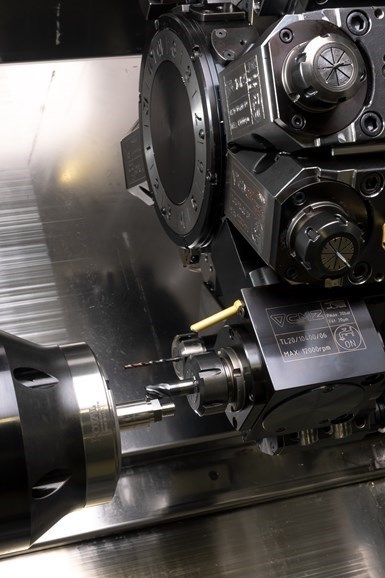Can Transparency Bring More Efficient Sourcing?
A resource that aims to be free for machine shops asks detailed capability information so parts can be matched to producers, and OEMs can target RFQs to shops that are ready to run the work.
Share





It is not hard for an OEM in need of machined parts with specific requirements to find a machine shop able to meet the need. The problem lies in also finding so many other shops at the same time that are not quite suited to the work. How does the buyer identify which of the shops that seem promising is actually a good fit?
And it is not hard for that same buyer seeking machining work to find shops with open capacity, even open capacity for particular machine types and travels. The problem is that capacity is not a commodity. Different shops use their capacities in different ways.
All of this is as much a problem for machine shops as it is for buyers of machining services. The overabundance of RFQs that shops contend with and sort through is in part a result of the lack of transparency, and the lack of knowledge, between manufacturing buyers and providers. Ironically, shops would be aided by a platform that would accurately characterize and filter them, and therefore in many cases accurately exclude them from consideration.
A group of supply-chain professionals formerly with SpaceX is now working to develop exactly this platform. Their company is Datum, and the platform they aim to commercialize is based on “radical transparency” into supplier capabilities, says CEO Robert Pakalski. I recently spoke with him about the company, its aims and what role it might play in buyer/supplier relationships of the future.
Significantly, he says only half of Datum is supply-chain experts. The startup’s staff of 10 at the moment I spoke with him included five from the supply-chain world and five with software expertise. The problems supply-chain leaders encounter are in some cases solvable using data the part file contains, he notes, if only the data can be effectively leveraged. The logic-based sourcing platform Datum is building interrogates CAD files in order to identify relevant machine types and machine travels, and in this way identify suppliers.
“Machine shops are not apples to apples,” Pakalski says. To be sure, they differ in far more than their machine types and capacities, but even these differences are opaque to OEMs, who themselves might be sourcing parts through purchasing professionals who don’t necessarily discern the different machining needs of different parts. Examples of the kinds of routine mismatches that result include RFQs for five-axis jobs being sent to three-axis shops, and large parts left hanging off the machine bed because the job was won by a shop with not quite the right work envelope size. And this says nothing of the complex part that cannot be machined efficiently by a given shop because it lacks a multitasking turning machine with the right Y-axis travel.

The work envelope of multitasking machines is an example of a capability metric useful for prequalifying shops. (This photo from Prosper-Tech Machine & Tool, which we wrote about here.)
On a multitasking machine, Pakalski notes there are fundamental characteristics important to qualify a given supplier to run a job. They include machine envelope in diameter and length; the various axes useful to the part and their travels; and the orientation of the spindle. From there, other machine parameters might prove valuable as additional qualification constraints. Meanwhile, other machine tool types have their own sets of important parameters. In characterizing machines, he says the team has focused on specifications apt to be germane to successfully machining parts needed by the space sector (the founders’ home field). Ultimately, interrogating the CAD file will allow for automatically identifying the machining process and the specific machine tool specs the part needs, including optional spec requirements added by the user, and Datum’s system will then be able to layer other considerations into the qualification such as a shop’s quality capabilities and its proximity to buyer.
It is a difficult analysis for software to perform automatically, but that is the aim. “We will start with space because we want to be able to nail one industry,” he says. The team will proceed industry by industry from there, and also proceed into other processes beyond CNC machining.
A test of 100 representative machined parts for the space sector so far shows Datum’s platform delivering 80% success at matching parts to correct shops. Further refinement can raise this to near 100%, the CEO says. When I spoke to him, there were 60 machining suppliers Datum had gathered into the platform that could be discovered there. He expects the number to be 100 by the time you read this, and more by the time this capability is tested as a sourcing resource by early OEM users.
Machine shops brought into the platform provide needed data about their machines and capabilities. They will also be able to freely flag and unflag their status as accepting work. Shops’ inclusion will be free of charge, Pakalski says, because Datum expects to profit by selling access to the manufacturing buyers, who need the assist in filtering and identifying suppliers. Once the buyer finds a promising supplier through the system, the buyer will communicate and contract with the shop directly.
“We won’t be a broker — we don’t want that role,” he says. Value will instead come from saving time for manufacturing buyers and delivering better manufacturing by more cleanly and accurately connecting parts to producers. OEMs will pay to employ the system, and to realize this value. For this reason, the Datum team expects shops will want to join and be discoverable there. In other words, Pakalski expects shops will want to be part of a network that is discerning and sensitive enough to sometimes rule them out.
Related Content
Solar Atmospheres Receives Northrop Grumman Approval for South Carolina Facility
All five Solar Atmospheres facilities are now an option for customers with Northrop Grumman requirements for vacuum heat treating.
Read MoreArch Cutting Tools Acquires Custom Carbide Cutter Inc.
The acquisition adds Custom Carbide Cutter’s experience with specialty carbide micro tools and high-performance burrs to Arch Cutting Tool’s portfolio.
Read MoreSchwanog Custom Form Tools Reduce Cycle Times
IMTS 2024: Schwanog’s insertable form tool system supports the manufacture of precision parts for industries such as medical, automotive, aerospace and others.
Read MoreIncreasing OEM Visibility to Shopfloor Operations for the Win
A former employee of General Motors and Tesla talks about the issues that led to shutdowns on factory lines, and what small- to medium-sized manufacturers can do today to win business from large OEMs.
Read MoreRead Next
Building Out a Foundation for Student Machinists
Autodesk and Haas have teamed up to produce an introductory course for students that covers the basics of CAD, CAM and CNC while providing them with a portfolio part.
Read MoreSetting Up the Building Blocks for a Digital Factory
Woodward Inc. spent over a year developing an API to connect machines to its digital factory. Caron Engineering’s MiConnect has cut most of this process while also granting the shop greater access to machine information.
Read More5 Rules of Thumb for Buying CNC Machine Tools
Use these tips to carefully plan your machine tool purchases and to avoid regretting your decision later.
Read More



















.png;maxWidth=300;quality=90)










